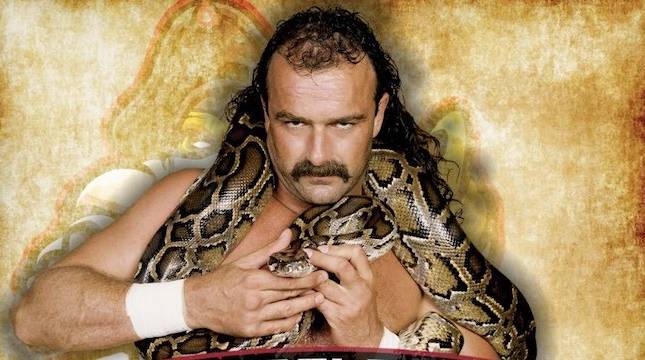
On a recent episode of his “The Snake Pit” podcast, WWE Hall of Famer Jake Roberts discussed working in Mid-Atlantic Wrestling in 1981, the Goon gimmick, and more.
You can check out some highlights from the podcast below:
On working with Austin Idol in Mid-Atlantic: “I dreaded working with him. And personally, he’s a great guy. Had no b*tch with him, no beef, nothing. But working with him is a lesson where you have to work around him. That’s the key. If you cannot get out work around him, you’re done.”
On the potential of Bobby Shane before he died in a 1975 plan crash: “Yeah, he had a great future in front of him, man. And he got pinned in the plan, man. His greatest fear was drowning. And that’s how he went, he drowned”
On rings in Mid-South being easier to bump in than WWE: “No, they still hurt you. But the rings up north were a little stout, that’s why guys didn’t do much in them.”
On the Goon gimmick: “I think the Goon thing was a great gimmick. He’s a hockey player, his whole thing is to go in and just punch and swing. That’s great.”
On being paired with Wahoo McDaniel in Mid-Atlantic: “It was all right. I’d still rather be in a singles match, though. Wahoo’s great. Great guy, great partner. But it makes you fight that much harder to try to get over, because everybody’s watching him.”
In a recent episode of his podcast, “The Snake Pit,” WWE Hall of Famer Jake Roberts shared some interesting insights about his time in Mid-Atlantic Wrestling in 1981, his thoughts on the Goon gimmick, and more. Let’s dive into some highlights from the podcast.
One of the topics discussed was Roberts’ experience working with Austin Idol in Mid-Atlantic. Despite having no personal issues with Idol, Roberts admitted that he dreaded working with him. He emphasized the importance of being able to work around someone like Idol. If you couldn’t adapt and find a way to work around him, it could be detrimental to your career.
The podcast also touched upon the potential of Bobby Shane before his untimely death in a plane crash in 1975. Roberts expressed that Shane had a promising future ahead of him and tragically met his demise in a way that aligned with his greatest fear – drowning.
Roberts also compared the wrestling rings in Mid-South to those in WWE, noting that while both rings could be painful to bump in, the ones up north were sturdier. This difference influenced the style of wrestling performed in those rings, as wrestlers didn’t do as much high-risk moves due to the ring’s construction.
The conversation then shifted to the Goon gimmick, which Roberts regarded as a great concept. The Goon was portrayed as a hockey player whose main objective was to enter the ring and deliver powerful punches and swings. Roberts appreciated the simplicity and effectiveness of this character.
Additionally, Roberts briefly discussed being paired with Wahoo McDaniel in Mid-Atlantic. While he acknowledged McDaniel’s greatness as a wrestler and partner, Roberts admitted that he preferred singles matches. Being paired with someone as prominent as McDaniel made him fight even harder to stand out and get over with the audience.
The podcast episode also included an embedded video featuring footage from Mid-Atlantic Wrestling in October 1981. The video provides a visual context for the topics discussed during the episode.
Overall, Jake Roberts’ insights into his time in Mid-Atlantic Wrestling, his thoughts on the Goon gimmick, and his experiences with fellow wrestlers shed light on the behind-the-scenes dynamics of the wrestling industry during that era. It’s always fascinating to hear firsthand accounts from wrestling legends like Roberts, who have played a significant role in shaping the sport we know today.
